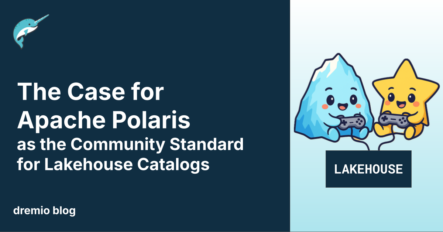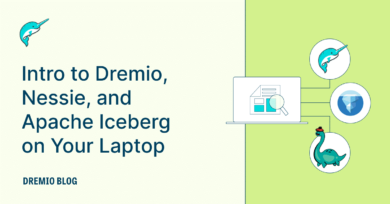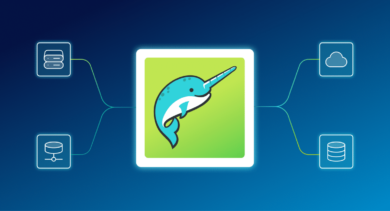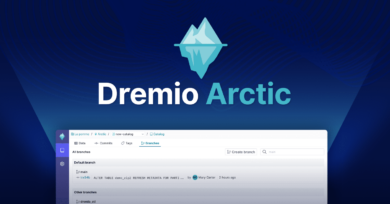6 minute read · May 19, 2025
The Case for Apache Polaris as the Community Standard for Lakehouse Catalogs
· Head of DevRel, Dremio

Download a Free Copy of Apache Iceberg: The Definitive Guide
Download a Free Copy of Apache Polaris: The Definitive Guide
Open standards have consistently proven to be long-term bets that reward those prioritizing community-driven ecosystems over closed, proprietary solutions. The trajectory of Apache Iceberg, once seen as playing catch-up to Delta Lake, demonstrates the power of open collaboration. What began as a format with feature gaps now leads the space with innovations like hidden partitioning, partition evolution, and widespread adoption across major platforms. Similarly, Apache Polaris is poised to take the mantle as the community standard for lakehouse catalogs, offering openness, interoperability, and enterprise-grade capabilities without vendor lock-in.
Why Community-Driven Standards Win
Community-led standards tend to grow more predictably and sustainably. Though they may initially trail proprietary counterparts in feature velocity, they make up for it with transparency, extensibility, and broad adoption. Apache Iceberg exemplifies this: while early on it had a greater disparity to other formats, it now boasts robust native support across AWS, Google Cloud, and an expanding number of query engines, including the comprehensive Dremio Lakehouse Platform.
Dremio not only supports Iceberg but enhances it with bundled capabilities like an integrated query engine, semantic layer, query federation, and intelligent table maintenance. Amazon S3’s support for native Iceberg tables and Google’s increasing Iceberg integrations reinforce that when a community standard gains momentum, it unlocks innovation at every layer of the stack. Polaris aims to do for lakehouse catalogs what Iceberg did for table formats: create a unified, vendor-neutral foundation that everyone can build on confidently.
Apache Polaris: A Catalog for the Open Lakehouse Era
Apache Polaris was co-created by Snowflake and Dremio, with its origins publicly announced at the Snowflake Summit 2024. Unlike catalog solutions that are tightly controlled by a single vendor, Polaris is governed by a diverse committee that includes Snowflake, Dremio, AWS, Google Cloud, Azure, and contributors from major players such as dbt Labs, Starburst, Stripe, Datadog, and GrubHub.
This collaborative governance structure is a cornerstone of its appeal; development is openly discussed, community-driven, and steered with input from a diverse array of stakeholders across the ecosystem.
Much like Apache Iceberg offered an alternative to vendor-driven formats, Polaris offers a counterweight to Unity Catalog, a powerful but vendor driven solution that is exclusively driven by Databricks. While Unity boasts extensive features, its roadmap is centralized. Polaris, on the other hand, offers a shared foundation that multiple vendors can rally around and extend without fear of unpredictable shifts or exclusive feature gating.
Try Dremio’s Interactive Demo
Explore this interactive demo and see how Dremio's Intelligent Lakehouse enables Agentic AI
Built for Interoperability, Enterprise Readiness, and Growth
Apache Polaris is already an enterprise-grade solution, offering multi-tenant capabilities, granular RBAC (role-based access control), and seamless integration through the Apache Iceberg REST Catalog specification. These features ensure compatibility with a growing ecosystem of engines, catalogs, and services while enabling platform portability.
By standardizing on Polaris, organizations can move their metadata between providers like Dremio and Snowflake with minimal friction. This interoperability is essential for avoiding vendor lock-in, especially as organizations move toward hybrid and multi-cloud strategies. Having a shared catalog standard ensures that services built around it—whether for governance, metadata management, AI integration, or analytics—can plug in without custom glue code.
A Strong Contender in a Growing Ecosystem
The Apache Iceberg ecosystem is already thriving with catalog solutions like AWS Glue, Apache Gravitino, Lakekeeper, and others. However, Polaris is uniquely positioned to be the community standard that these and future tools can align with. Its RESTful architecture, neutral governance, and commercial backing across multiple vendors make it a durable, extensible choice for the future of open lakehouse architectures.
Just as Apache Iceberg enabled a flourishing ecosystem of engines and tools that spoke a common language at the table level, Polaris is laying the groundwork for a universal catalog layer. With commercial offerings like Dremio's Enterprise Catalog and Snowflake's Open Catalog already supporting Polaris, the momentum is real—and growing.
Conclusion: A Standard Worth Building On
The future of the lakehouse depends on collaboration. Apache Polaris embodies the principles of openness, vendor neutrality, and enterprise readiness that modern data platforms demand. By aligning around Polaris, the data community can reduce integration friction, encourage ecosystem growth, and give organizations the freedom to innovate without fear of vendor lock-in.
As we saw with Iceberg, the power of a community-driven standard isn’t just in the technology—it’s in the network of innovation it unleashes. Apache Polaris is on track to do the same for catalogs, and now is the time to build on it.
Earn your Verified Dremio Associate badge from Dremio university.


